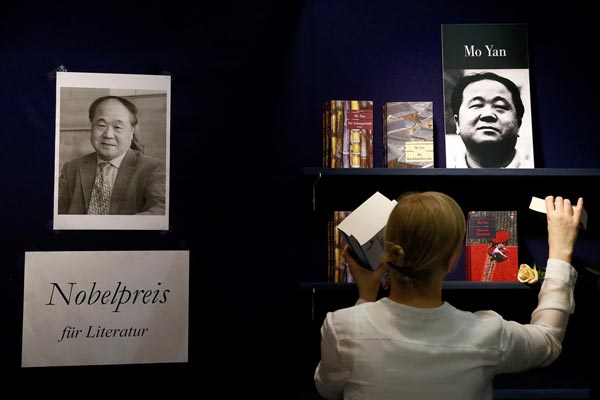Mo pens Nobel success story
Updated: 2012-10-12 01:40
(China Daily)
|
||||||||
Writer praised for 'hallucinatory realism' wins recognition from the Swedish Academy, Liu Wei reports.
Writer Mo Yan won the Nobel Prize for Literature on Thursday. The Swedish Academy, which gives out the annual prizes, described Mo's works as "hallucinatory realism" merging "folk tales, history and the contemporary".
|
 Books by Mo Yan are put on prominent display at the Frankfurt book fair on Thursday. Mo is the first Chinese national to win the Nobel Prize for Literature.[Photo/Agencies] |
"Through a mixture of fantasy and reality, historical and social perspectives, Mo Yan has created a world reminiscent in its complexity of those in the writings of William Faulkner and Gabriel García Márquez, at the same time finding a departure point in old Chinese literature and in oral tradition," according to the citation for the award.
Mo, 57, whose real name is Guan Moye, is the first Chinese writer to win the honor, which also comes with a financial award of 8 million Swedish krona, or $1.2 million.
"I grew up in an environment immersed with (Chinese) folk culture, which inevitably come into my novels when I pick up a pen to write. This has definitely affected — even decided — my works' artistic style," Mo told a group of reporters at a hotel in his hometown of Gaomi, in Shandong province, shortly after he won the award.
"Mo Yan deserves the prize simply for being a great writer," said Eric Abrahamsen, a seasoned critic and founder of Paper Republic, an English-language website on Chinese literature.
"Throughout his career he has done much to develop the language and style of contemporary Chinese literature, and he has also tackled many of the ‘big' historical and social themes of contemporary China."
The buzz on Chinese media about Mo possibly winning the prize started about a month ago, when some betting agencies started placing Mo as a contender.
In early October, British bookmakers Ladbrokes put Mo next to Japanese writer Haruki Murakami as the leading bets but Murakami had odds of 3 to 1, while Mo lagged behind at 8 to 1.
Although China boasts a tradition of literature and scholarship, few writers have won international acclaim and recognition. And for that reason, the Nobel Prize for Literature has always been an aspiration for Chinese writers. Mo's win will shift the focus to more previously unknown Chinese works.
Although he has allowed few media interviews, Mo is well known.
In contrast with his appearance, his works are anything but down home and country. They are dramatic, with "a unique style, sharp language, wild imagination and magnificent narration," according to Ye Kai, a senior editor who has edited Mo's works.
Mo created a cast of colorful characters, and once said that if there was a prototype, it would be the abandoned and ignored "black boy" who first appeared in the 1985 novella Red Transparent Radish, which may bear imprints of the author's childhood.
Mo's family was categorized as rich middle-class peasants, which meant he was close to being labeled "class enemy". He dropped out of school and became a cowherd. At 20, he left his hometown and joined the army.
In another 1985 novella White Dong Swing, Mo first wrote about Gaomi Northeast Township, generally believed to be based on his hometown in East China's Shandong province. In a short story published the same year, Autumn Water, he mentioned the landscape again.
Related readings:
Mo Yan 'very surprised' upon winning Nobel
Newest novel a rural drama
From books to blockbusters

 Relief reaches isolated village
Relief reaches isolated village
 Rainfall poses new threats to quake-hit region
Rainfall poses new threats to quake-hit region
 Funerals begin for Boston bombing victims
Funerals begin for Boston bombing victims
 Quake takeaway from China's Air Force
Quake takeaway from China's Air Force
 Obama celebrates young inventors at science fair
Obama celebrates young inventors at science fair
 Earth Day marked around the world
Earth Day marked around the world
 Volunteer team helping students find sense of normalcy
Volunteer team helping students find sense of normalcy
 Ethnic groups quick to join rescue efforts
Ethnic groups quick to join rescue efforts
Most Viewed
Editor's Picks

|

|

|

|

|

|
Today's Top News
Health new priority for quake zone
Xi meets US top military officer
Japan's boats driven out of Diaoyu
China mulls online shopping legislation
Bird flu death toll rises to 22
Putin appoints new ambassador to China
Japanese ships blocked from Diaoyu Islands
Inspired by Guan, more Chinese pick up golf
US Weekly

|

|






